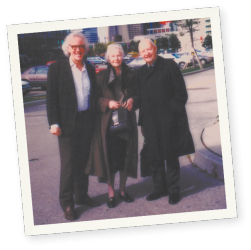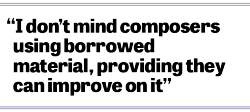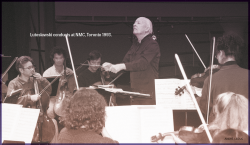 {The following is excerpted and adapted from a text delivered by Robert Aitken at the Symposium “Lutoslawski – Music and Legacy” held on October 26, 2013 at the Schulich School of Music of McGill University in collaboration with The Polish Academy of Arts and Sciences in Krakow and The Polish Institute of Arts and Sciences in Canada, to commemorate the centennial of composer Witold Lutoslawski’s birth.}
{The following is excerpted and adapted from a text delivered by Robert Aitken at the Symposium “Lutoslawski – Music and Legacy” held on October 26, 2013 at the Schulich School of Music of McGill University in collaboration with The Polish Academy of Arts and Sciences in Krakow and The Polish Institute of Arts and Sciences in Canada, to commemorate the centennial of composer Witold Lutoslawski’s birth.}
There are many things in life which come to be obvious. As the years go by you forget when you learned them and think that you always knew them. They become truisms that you expect everyone to know — a kind of self-evident knowledge. Was there actually a time in my life when I did not understand that Poland was truly a leader in contemporary music? I just knew it and continued to believe so for many years up to the present. So when I was invited to give this reminiscence on Witold Lutoslawski I was pleased to rethink this important part of my past to ascertain just when and what it was that brought about my great interest in Polish music and led ultimately to inviting Lutoslawski to Toronto.
As best as I can remember it was on my first trip to Iceland in 1966, one of 26 visits there, that I met musicians who had studied in Poland and a number of (very) established composers who had worked at the electronic studio in Warsaw. They regaled me with stories of vodka and the antics of Józef Patkowski and other patriotic artists who had confronted the regime and gone on in their pioneering experiments with music, electronic and otherwise. And it was about this time that Penderecki and Lutoslawski composed their astounding, groundbreaking string quartets which opened the door for many composers to a whole new musical world.
Then two years later, again in Iceland at the 1968 ISCM Festival, I met a number of Polish musicians including Włodzimierz Kotoński who, as head of the music department of the Polish Radio, invited me to play on Polish television ... Of course a visa was required and was supposedly waiting for me at the Polish embassy in Copenhagen. After three days of waiting, I gave up on that particular visit.
Still, I was anxious to see Poland so one year later, with a visa from Toronto in hand, I entered the world of Eastern Europe and was picked up by Kotoński at the airport in Warsaw ... I had asked several times, even the year before, what dress they would like for television but no answer was forthcoming. Now it was to be tails, which no musician likes travelling with, especially the hard-fronted shirt. “Never mind” they said, “We have a costume department.” Well, they had a costume department, but nothing my size, and the suit I was eventually able to squeeze into harboured a few moths, but the holes were not too noticeable.
Once I was suitably attired we went straight into the studio and started taping. The first piece was recorded before I knew it and I was amazed; even more amazed when they asked if I would like to hear it and if there were any passages I wanted to record again. Never in my life had a television producer asked me if for musical reasons I would like to record something again. And never in my lifetime had I stood in a television studio with the first take being recorded. By the end of the afternoon, in a similar fashion, the entire recital was filmed. In Toronto it would have required an entire day and in Germany perhaps three. Every shot would have been carefully planned and no one would ever ask if I was content with my performance. A later film, from Katowice with Klaus Huber introduced by John Cage ... was the same story, fabulous improvisation with outstanding artistic results. Several of my best publicity photos came from that production.
Well on this first trip to Poland I did not meet Lutoslawski, but I wrote him a letter in March 1977 inviting him to Canada. He had no time during the 1977/78 season but knew I was coming to the Warsaw Autumn Festival, my first visit there, and said that we could discuss the Toronto program at that time. Then because his Novelette for Rostropovich and the National Symphony Orchestra in Washington was not finished, he delayed that concert again, from the 78/79 season to the following one, so as to also include a conducting engagement in the USA. (This is often the way with important composers as the composing is far more important to them than hearing the work performed.)
First meeting: But even delays come to an end. In 1980 Mr. and Mrs. Lutoslawski attended a performance of his work with the Montreal Symphony, then came to Toronto in time for a reception at the Polish Consulate on April 12, 1980 and stayed in town until the New Music Concert on April 19, giving his attention in between to interested composition students and a major lecture in Walter Hall on April 18 (plus of course rehearsals for the concert). What little time was left, he spent composing in the hotel room and proofreading the manuscript which his wife Danuta copied each day. (Witold was very proud to talk about his wife, the fabulous life they had together and what a wonderful music copyist she was because of her training as a draftsman. There is no question that his scores are immaculate because of her talent and of course her devoted love and appreciation for her husband.)
Naturally we rehearsed in advance of his arrival, which may not have been necessary because after reading through the Preludes and Fugue at the first rehearsal, Lutoslawski said “Bob, what do you expect me to do? Everything is perfect.” Needless to say he did find more to do, especially with Paroles tissées for tenor and ensemble. But then he went on to say that in North America the orchestras were always well prepared and far less rehearsal was required than for his concerts in Europe. In Germany, for example, he said most players see the music for the first time when they find it on their music stand at the first rehearsal. Whereas he had recently conducted in Cleveland and several players came to him with questions about their parts even before the rehearsal began, so he knew they had looked at the music in advance.
It is impossible to tell stories of this nature without hearing in your mind’s ear Lutoslawski’s wonderful, inimitable upper class English accent, extremely polite and correct with one subjunctive clause after another. He rarely told you what he wanted but usually asked in a very polite manner. Such as, “Would it be too much trouble? ...” or “Do you suppose we could? ...” When visiting, he always brought presents for my wife and me such as the tie I am wearing today. It became my lucky concert tie until the colour disappeared from over-wearing. I wore it at almost every performance for many years as a good luck charm.
During the ensuing years, I was frequently in Poland, three times for the Warsaw Autumn Festival, a recital for the Warsaw Philharmonic, twice teaching and performing in Kazimierz Dolny (including the period of Solidarity when airplanes flew overhead and tanks went through the streets), various other concerts and the aforementioned film in Katowice. We met from time to time but mostly in passing except for a week together in Kazimierz and an invitation to their Polish home which I was pleased to see was very modest, much like our own.
 Outside Oslo: As I was also frequently in Norway at the time, I also had the occasion to visit the Lutoslawskis in their Oslo home. It was more like a cottage just outside the city not far from the family home of Marcin Boguslawski, Danuta’s son. That visit turned out to be an evening which anyone who knew Lutoslawski finds hard to believe. I do have a feeling it was some kind of noted holiday somewhere in the world as the afternoon began very relaxed with an aperitif or two or three. I think it was something harmless like Cinzano or Campari, not vodka, but then came the question in that unforgettable slightly whiney aristocratic accent, “How would you feel about some wine?” and following my affirmative response, “Do you suppose white would be appropriate?” Of course some excellent food from Danuta came next and when we, the two of us that is, had finished the bottle of Puligny-Montrachet there was another question: “What do you think about some red wine? Do you suppose this bottle of Château Lafite Rothschild would do?” But you know, one bottle of red was not enough. We followed it with another superior wine. At this point Danuta was beginning to get nervous but her concerns were gently pushed aside by Witold as he asked me if I had perhaps some interest in a Cognac? ... Well it would be unfair of you to ask what we discussed that evening, but I do know that at one point I asked Lutoslawski how he felt about all the parody pieces which composers like George Crumb and Rochberg etc were writing at that time. He said “Oh, I don’t mind composers using borrowed material, providing they can improve on it. Debussy for example.”
Outside Oslo: As I was also frequently in Norway at the time, I also had the occasion to visit the Lutoslawskis in their Oslo home. It was more like a cottage just outside the city not far from the family home of Marcin Boguslawski, Danuta’s son. That visit turned out to be an evening which anyone who knew Lutoslawski finds hard to believe. I do have a feeling it was some kind of noted holiday somewhere in the world as the afternoon began very relaxed with an aperitif or two or three. I think it was something harmless like Cinzano or Campari, not vodka, but then came the question in that unforgettable slightly whiney aristocratic accent, “How would you feel about some wine?” and following my affirmative response, “Do you suppose white would be appropriate?” Of course some excellent food from Danuta came next and when we, the two of us that is, had finished the bottle of Puligny-Montrachet there was another question: “What do you think about some red wine? Do you suppose this bottle of Château Lafite Rothschild would do?” But you know, one bottle of red was not enough. We followed it with another superior wine. At this point Danuta was beginning to get nervous but her concerns were gently pushed aside by Witold as he asked me if I had perhaps some interest in a Cognac? ... Well it would be unfair of you to ask what we discussed that evening, but I do know that at one point I asked Lutoslawski how he felt about all the parody pieces which composers like George Crumb and Rochberg etc were writing at that time. He said “Oh, I don’t mind composers using borrowed material, providing they can improve on it. Debussy for example.”
Banff: Our next meeting was in 1986 at the Banff Centre where I was in charge of contemporary music and of woodwind teaching for nine years, and at that time director of the winter program. The Lutoslawskis were very pleased to be there and very generous with their time and energy. But the first thing Danuta did when she saw their lovely apartment with a fabulous view of the mountains was take a pan of water from the kitchen and throw it all over the floor. I was shocked until I took a moment to remember that she did suffer from a respiratory ailment and this would bring badly needed moisture to the dry mountain air. I’m sure she noticed that it was industrial carpeting and no harm would be done.
Always the gentleman, Lutoslawski coached and conducted from morning to night. Like John Cage, he was always prompt. If there was a rehearsal at 9am and I said he could come late, he always said “No. I’ll be there.” The library at the Banff Centre was excellent at that time and he spent a lot of time there. The New Grove Dictionary had just been issued and was being collected one volume at a time. Witold was particularly interested in it and was pleased to point out to me the fictitious personality Dag Henrik Esrum-Hellerup who had been invented and was listed in the edition.
Two Polish violists both coincidentally named Darius were in residence at the time and the Lutoslawskis were very concerned about them as Banff could only pay 85 per cent of their costs. Witold gave me spending money for them if they became destitute but their performances in music theatre and a concert for the Polish Cultural Society in Calgary brought them enough spending money and their housing over the Christmas break so I sent the money back to him. But this was the kind of man he was and I am sure accounts for much of the love Poland bestows upon him.
 Toronto 1993: We next invited Lutoslawski to Toronto in 1991; we would have done so sooner but most of his new repertoire in that period was orchestral which NMC could not afford to perform. That concert also took two years to come to fruition and again it was thanks to an invitation from Montreal, to receive an honourary doctorate from McGill University on October 30. Our concert was on October 24, the week before ... The first rehearsal was again, he claimed, almost perfect. This time the concert was recorded by the CBC with the plan to release it as a live recording. Little did we know that there would be a little old lady coughing in the first row ... and that this would be Witold Lutoslawski’s last conducted concert.
Toronto 1993: We next invited Lutoslawski to Toronto in 1991; we would have done so sooner but most of his new repertoire in that period was orchestral which NMC could not afford to perform. That concert also took two years to come to fruition and again it was thanks to an invitation from Montreal, to receive an honourary doctorate from McGill University on October 30. Our concert was on October 24, the week before ... The first rehearsal was again, he claimed, almost perfect. This time the concert was recorded by the CBC with the plan to release it as a live recording. Little did we know that there would be a little old lady coughing in the first row ... and that this would be Witold Lutoslawski’s last conducted concert.
Considerable effort went into editing out the wheezing and other extraneous noises and New Music Concerts released the recording at its own expense in 1994. For this purpose our NMC photographer André Leduc took a large number of photographs and in the sport of the occasion Witold was pleased to pose in a number of (very) amusing ways. The last several hundred copies of this original edition were purchased by the Lutoslawski Society and then, in 2010, it was taken on by Naxos which, with the largest distribution in the world, has given it a far greater exposure. It was reissued again in 2013 as the final disc in the Naxos 10CD Lutoslawski Centennial Collection.
Well, the end of his life is well known to all of you. It is a terrible disease but in this case mercifully short. (Morton Feldman and my father also succumbed to pancreatic cancer and passed away within three months of diagnosis.)
Lutoslawski was a wonderful man whom we all miss. He left a magnificent legacy of music, fine performances and memories of a perfect gentleman with a sense of humour, profound thought, a monumental artist full of humility.
I am thankful for the wonderful music he wrote but wish he had composed one more piece. I and other flutists continuously asked him to write something for flute. “Well,” he told me “even if you commission it I, unlike some other composers, always write my pieces in the order that they are commissioned. I have accepted more orchestral commissions than I can complete in a lifetime. I write very slowly, only one piece a year. But,” he said, “if I choose to write a piece not commissioned between the other works no one can complain. But first I need an idea.” His last two letters to me said (January 17, 1992) “Of course my dream is to bring a flute piece. But it must be born ...” and (March 28, 1992) “Flute piece? I would love to write it and it is now more probable for me to be able to think about it than ever before. But first I must get some good ideas for it.” Then I spoke to him on the telephone and he said he had an idea for flute and piano and had begun some sketches ...
Robert Aitken has been artistic director of New Music Concerts since its founding in 1971.



